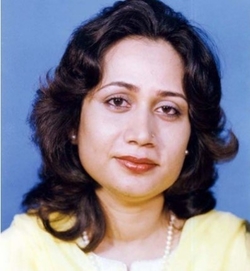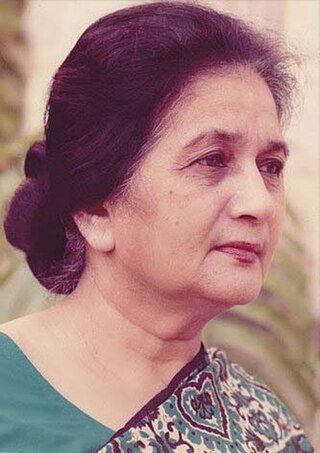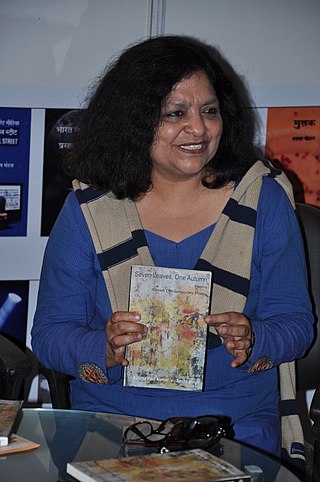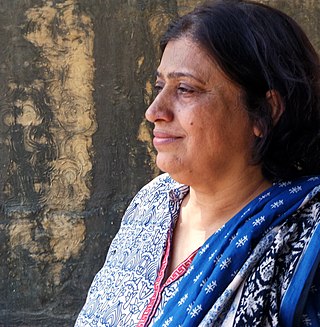Pakistani literature is a distinct literature that gradually came to be defined after Pakistan gained nationhood status in 1947, emerging out of literary traditions of the South Asia. The shared tradition of Urdu literature and English literature of British India was inherited by the new state. Over a big time of period a body of literature unique to Pakistan has emerged in nearly all major Pakistani languages, including Balochi, English, Pushto, Punjabi, Seraiki, Sindhi, and Urdu,.

BegumShaista Suhrawardy Ikramullah was a Bengali Pakistani politician from Bengal, diplomat and author. She was the first Muslim woman to earn a PhD from the University of London. She was Pakistan's ambassador to Morocco from 1964 to 1967, and was also a delegate to the United Nationsdebating for a more gender inclusive language in the Universal Declaration of Human Rights.
Khalid Hasan was a Pakistani journalist and writer. Author and editor of several books, in addition to being a regular columnist for a number of English-language Pakistani newspapers, he is best known for his translations of the short stories of Saadat Hasan Manto and the poems of Faiz Ahmed Faiz.
Bina Shah is a Pakistani writer, columnist and blogger living in Karachi.

Qurratulain Hyder was an Indian Urdu novelist and short story writer, an academic, and a journalist. One of the most outstanding and influential literary names in Urdu literature, she is best known for her magnum opus, Aag Ka Darya, a novel first published in Urdu in 1959, from Lahore, Pakistan, that stretches from the fourth century BC to post partition of India.
Muhammad Munawar Mirza, was a prominent Iqbal scholar, historian, writer and intellectual from Pakistan.

Parveen Shakir was a Pakistani poet, teacher and a civil servant of the government of Pakistan. She is best known for her poems, which brought a distinctive feminine voice to Urdu literature.
The academic discipline of women's writing is a discrete area of literary studies which is based on the notion that the experience of women, historically, has been shaped by their sex, and so women writers by definition are a group worthy of separate study: "Their texts emerge from and intervene in conditions usually very different from those which produced most writing by men." It is not a question of the subject matter or political stance of a particular author, but of her sex, i.e. her position as a woman within the literary world.
Kishwar Naheed is a feminist Urdu poet and writer from Pakistan. She has written several poetry books. She has also received awards including Sitara-e-Imtiaz for her literary contribution to Urdu literature.

Feminist literature is fiction, nonfiction, drama, or poetry, which supports the feminist goals of defining, establishing, and defending equal civil, political, economic, and social rights for women. It often identifies women's roles as unequal to those of men – particularly as regarding status, privilege, and power – and generally portrays the consequences to women, men, families, communities, and societies as undesirable.

Krishna Sobti was an Indian Hindi-language fiction writer and essayist. She won the Sahitya Akademi Award in 1980 for her novel Zindaginama and in 1996, was awarded the Sahitya Akademi Fellowship, the highest award of the Akademi. In 2017, she received the Jnanpith Award for her contribution to Indian literature.
Pakistani English literature refers to English literature that has been developed and evolved in Pakistan, as well as by members of the Pakistani diaspora who write in the English language. English is one of the official languages of Pakistan and has a history going back to the British colonial rule in South Asia ; the national dialect spoken in the country is known as Pakistani English. Today, it occupies an important and integral part in modern Pakistani literature. Dr. Alamgir Hashmi introduced the term "Pakistani Literature [originally written] in English" with his "Preface" to his pioneering book Pakistani Literature: The Contemporary English Writers as well as through his other scholarly work and the seminars and courses taught by him in many universities since 1970's. It was established as an academic discipline in the world following his lead and further work by other scholars, and it is now a widely popular field of study.

Ada Jafarey, often spelled Ada Jafri, was a Pakistani poet who is regarded as the first major female Urdu poet to be published and has been called "The First Lady of Urdu Poetry". She was also an author and was considered a prominent figure in contemporary Urdu literature. She received awards from the Government of Pakistan, the Pakistan Writers' Guild, and literary societies of North America and Europe in recognition of her efforts.

Sukrita Paul Kumar is an Indian poet, critic, and academician. She has been the chief editor of Cultural Diversity, Linguistic Plurality and Literary Traditions of India – a textbook prescribed by the University of Delhi for course use in its Honours B.A. programme.
Rukhsana Ahmad is a Pakistani writer of novels, short stories, poetry, plays, and a translator, who after marriage migrated to England for further studies and pursue a career in writing. She has campaigned for Asian writers, particularly women.

Sajida Zaidi was an Indian educationist, writer in the Urdu language, and poet. For many years she was a professor and head of the Department of Education at the Aligarh Muslim University (AMU) until her 1966 retirement.

Attiya Dawood is a Sindhi poet, writer, feminist and activist. She was born in Moledino Larik She has been hailed as one of the most important feminist Sindhi writers of her time. Attiya uses her poetry to highlight the oppression of women in Sindhi society in the name of tradition. She has been writing poetry since 1980.
Salma Shaheen is a Pakistani poet, fiction writer, researcher, and the first Pashto-woman novelist, who also served as the first-woman director of Pashto Academy of University of Peshawar. She primarily wrote poems in Urdu and Pashto languages since started her literary work. Shaheen is recognized one of the prominent women writers in Khyber Pakhtunkhwa who is believed to have made a significant contribution to Pashto language, culture and to its literature.
Razia Sajjad Zaheer was an Indian writer in the Urdu language, a translator, and a prominent member of the Progressive Writers Association. She won the Uttar Pradesh Sahitya Akademi Award as well as the Soviet Land Nehru Award.

The Holy Woman is an English language novel by Pakistani-British novelist Qaisra Shahraz first published in 2001 and is the debut novel of the author. The novel deals with the themes of the deeply rooted issues of a Pakistani society such as women rights, feudalism and feminism. Set in contemporary Pakistan (Sindh), London and Egypt, the story revolves around a 28-years old brave, bold and beautiful Zarri Bano, the daughter of a wealthy landowner who stands against the injustice and shows resilience.









